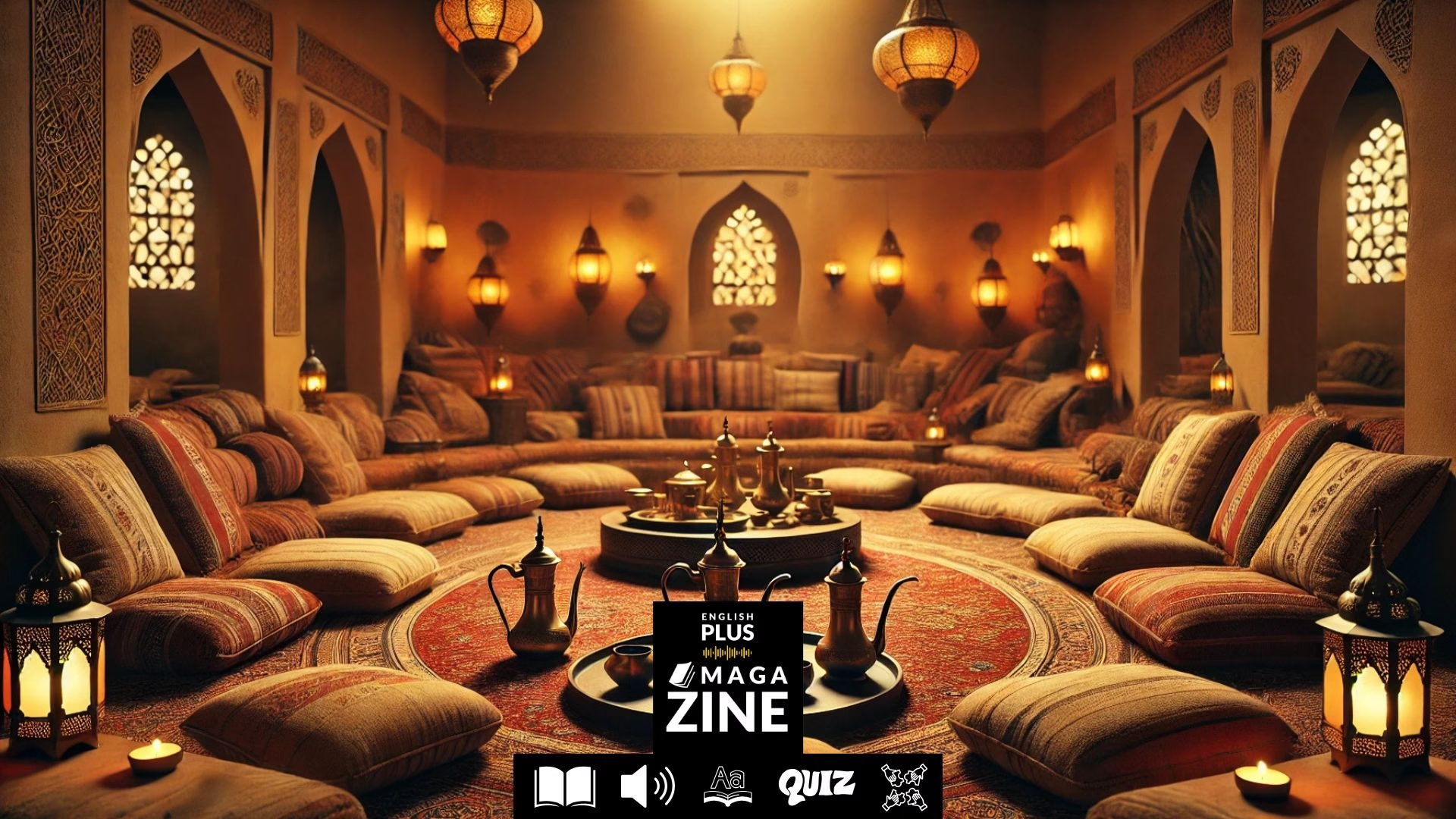- Deep Dive Intro
- Roots in Hospitality: A Bedouin Legacy
- More Than Just a Gathering: Functions of the Majlis
- The Modern Majlis: Evolution and Adaptation
- The Enduring Significance of the Majlis
- Reading Comprehension Quiz
- Let’s Talk | Listening Comprehension Practice
- Listening Comprehension Quiz
- Let’s Learn Vocabulary in Context
- Vocabulary Quiz
- Let’s Discuss & Write
- Learn with AI
- Let’s Play & Learn
Deep Dive Intro
In the heart of Saudi Arabia, amidst the shifting sands and modern skyscrapers, lies a tradition as enduring as the desert itself: the Majlis. More than just a place or an event, the Majlis is a cornerstone of Saudi Arabian culture, a vibrant testament to the values of community, hospitality, and open dialogue. It is where stories are shared, decisions are made, grievances are aired, and bonds are strengthened. Imagine a space where everyone, regardless of their social standing, can come together, sip aromatic Arabic coffee, and engage in conversations that range from the mundane to the momentous. That, in essence, is the spirit of the Majlis. Let’s step inside this fascinating cultural institution and explore its rich tapestry.
Roots in Hospitality: A Bedouin Legacy
The tradition of the Majlis has deep roots in the nomadic Bedouin culture of the Arabian Peninsula. In the harsh desert environment, hospitality was not merely a courtesy but a necessity for survival. Offering shelter, food, and a welcoming space to travelers was a fundamental aspect of Bedouin life. The Majlis, often held in a tent known as a “bayt al-sha’ar” (house of hair), served as this vital space for receiving guests, fostering social cohesion, and resolving disputes within the tribe.
This legacy of hospitality remains central to the modern Majlis. While the setting might have evolved from a simple tent to a more permanent structure within a home or a designated public space, the underlying principle of welcoming guests with warmth and generosity persists. It’s a cultural imperative, deeply ingrained in Saudi Arabian society, reflecting a profound respect for visitors and a commitment to communal well-being.
More Than Just a Gathering: Functions of the Majlis
The Majlis serves a multitude of functions within Saudi Arabian society, acting as a dynamic hub for social, political, and judicial interactions.
1. Social Gathering and Networking:
At its core, the Majlis is a vital space for social interaction. It provides an opportunity for people to connect with family, friends, neighbors, and even strangers. These gatherings foster a sense of community, allowing individuals to build relationships, exchange news, and stay informed about local happenings. Think of it as the original social network, long before the advent of the internet.
2. Conflict Resolution and Mediation:
Historically, and even today, the Majlis plays a significant role in resolving disputes and mediating conflicts. It provides a neutral and informal setting where individuals or groups can come together to discuss their differences, often with the guidance of respected community elders or leaders. The emphasis is on finding amicable solutions through dialogue and compromise, reflecting a preference for restorative justice over formal legal proceedings in certain matters.
3. Political Discourse and Governance:
In Saudi Arabia, the Majlis also has a political dimension. Traditionally, tribal leaders and, in the modern context, government officials often hold Majlis to hear the concerns and grievances of their constituents. This provides a direct channel for citizens to voice their opinions, ask questions, and engage with those in positions of authority. It’s a unique form of participatory governance, allowing for a bottom-up flow of information and feedback.
4. Education and Transmission of Culture:
The Majlis serves as an important platform for the transmission of cultural values, traditions, and knowledge from one generation to the next. Through storytelling, poetry recitation, and discussions on history and heritage, the younger generation learns about their cultural identity and the values that underpin Saudi Arabian society. It’s a living classroom where wisdom is shared and cultural continuity is ensured.
5. Hospitality and Generosity:
As mentioned earlier, hospitality is a cornerstone of the Majlis. Guests are typically offered refreshments, most notably Arabic coffee (gahwa), dates, and sometimes a lavish meal. The act of serving and receiving these offerings is laden with cultural significance, symbolizing respect, generosity, and goodwill. Turning down an invitation to a Majlis, without a valid reason, can be considered impolite, highlighting the importance placed on this tradition.
The Modern Majlis: Evolution and Adaptation
While the fundamental principles of the Majlis remain intact, its form and setting have evolved over time to reflect the changing socio-economic landscape of Saudi Arabia.
1. From Tent to Structure:
While Bedouin-style tents are still used, especially in rural areas or for special occasions, the Majlis is now more commonly held in dedicated rooms within homes, purpose-built structures attached to residences, or even in designated public spaces. These modern Majlis are often comfortably furnished with floor cushions, sofas, and adorned with traditional decorations.
2. Open to All (Mostly):
Traditionally, Majlis were often gender-segregated, with men gathering in one space and women in another. While this practice continues in many households, there is a growing trend towards mixed-gender Majlis, particularly in more urban and modern settings, reflecting evolving social norms.
3. Technology and the Majlis:
Even in the digital age, the Majlis retains its importance as a face-to-face gathering. However, technology has subtly influenced the tradition. Mobile phones might be present, but they are often used respectfully, and the focus remains on in-person interaction. In some cases, virtual Majlis might even be held to connect with individuals who are geographically distant.
4. Royal Majlis:
At the highest level of governance, the Saudi Arabian monarch and other members of the royal family hold open Majlis where citizens can directly address them with their concerns. These events are a significant aspect of the country’s political system, underscoring the enduring importance of this tradition in facilitating communication between the rulers and the ruled.
The Enduring Significance of the Majlis
In a rapidly globalizing world, the tradition of the Majlis in Saudi Arabia stands as a powerful reminder of the enduring importance of community, dialogue, and hospitality. It is a cultural institution that has adapted to modern times while retaining its core values. The open tent of conversation, whether literal or metaphorical, continues to be a vital space for Saudis to connect, communicate, and collectively navigate the complexities of life. By understanding the Majlis, we gain a deeper appreciation for the rich cultural heritage and social fabric of Saudi Arabia. It is a tradition that speaks volumes about the values that lie at the heart of this dynamic nation.
Reading Comprehension Quiz
Let’s Talk | Listening Comprehension Practice
Listening Transcript: Please don’t read the transcript before you listen and take the quiz
So, the Majlis in Saudi Arabia, huh? That sounds like a really cool tradition. It’s more than just a get-together; it’s like the heart of the community, a place where people connect, solve problems, and just hang out. It reminds me a bit of those old town squares you see in movies, except with more Arabic coffee and probably way better stories.
What really struck me was how deeply rooted it is in hospitality. That Bedouin legacy of offering shelter and welcome in the desert – that’s something really special. It makes you think about how different cultures have developed these core values based on their environments and needs. For the Bedouin, it wasn’t just being nice; it was about survival. And that spirit of generosity seems to have carried through to the modern Majlis.
The article talked about all the different functions the Majlis serves. It’s like this multi-purpose social hub. It’s where you catch up with friends and family, but it’s also where you might go to sort out a disagreement with a neighbor or even voice your concerns to someone in power. That’s pretty unique, isn’t it? It’s like having a built-in community forum right there in people’s homes or neighborhoods.
I found the conflict resolution aspect particularly interesting. The idea of using dialogue and compromise to find solutions, rather than immediately jumping to formal legal processes… there’s something really appealing about that. It feels more personal and community-oriented. I wonder if we could use a bit more of that approach in our own societies, where sometimes it feels like everything ends up in court.
And the political side of it, with officials holding Majlis to hear from their constituents – that’s a really direct form of engagement. It’s like having an open-door policy where people can actually talk to their leaders. You don’t see that everywhere. It makes you think about different ways societies can facilitate that kind of communication between the people and those in charge.
The Majlis as a place for education and passing down culture is also super important. Think about all the stories, the poetry, the history that gets shared in those gatherings. It’s a living, breathing way to keep traditions alive and connect with your heritage. It’s like an informal university of culture happening right there in people’s living rooms.
And let’s not forget the hospitality part – the Arabic coffee and dates! That sounds like my kind of gathering. Food and drink are such a universal way to bring people together, and the article mentioned how symbolic those offerings are in the Majlis. It’s all about showing respect and goodwill.
It’s interesting how the Majlis has adapted to modern times too. From tents to dedicated rooms, and even the subtle influence of technology. It shows that traditions can be resilient and evolve with society while still holding onto their core values. The mention of gender segregation in some Majlis but a trend towards mixed gatherings in more urban areas also highlights how social norms can change over time within a cultural framework.
Thinking about all this makes me wonder about similar traditions in other cultures. Do you know of any other social gatherings that serve multiple purposes like the Majlis? Maybe something in your own community? What do you think are the key ingredients that make a tradition like this so enduring and important? Is it the focus on hospitality? The opportunity for open dialogue? The sense of community it fosters?
I also wonder how easy it would be for someone from a completely different cultural background to navigate a Majlis for the first time. What are some unspoken rules or customs they might need to be aware of? It sounds like a very welcoming environment, but I’m sure there are nuances that are important to understand.
Overall, learning about the Majlis has given me a really interesting glimpse into Saudi Arabian culture. It’s a reminder that even in our increasingly interconnected world, these unique traditions that emphasize community and connection are still so vital. It makes you appreciate the power of a simple gathering and the importance of creating spaces where people can come together, share, and build relationships. What are your thoughts? Has this made you think about the traditions in your own culture in a new light?
Listening Comprehension Quiz
Let’s Learn Vocabulary in Context
Alright, let’s dive into some of the key words and phrases we used when we were exploring the tradition of Majlis in Saudi Arabia. Understanding these terms can really enrich your understanding of different cultures and how they function.
First off, we talked about enduring as the desert itself. “Enduring” means lasting over a long period of time. The desert is often seen as timeless and unchanging, so saying something is as enduring as the desert emphasizes its long-lasting nature. We used this to describe the tradition of Majlis. You might say someone’s love for their family is enduring, meaning it will last a long time.
Then we used the term cornerstone. A cornerstone is the fundamental building block of something, the essential part on which everything else depends. We called the Majlis a cornerstone of Saudi Arabian culture. You might say that trust is the cornerstone of any good relationship.
We also talked about vibrant. If something is vibrant, it means it’s full of energy, life, and enthusiasm. We described the Majlis as a vibrant tradition. A vibrant city is full of activity and excitement, or vibrant colors are bright and striking.
The article mentioned testament to. If something is a testament to something else, it serves as clear evidence or proof of it. We said the Majlis is a testament to the values of community and hospitality. The success of a project might be a testament to the hard work of the team.
We used the phrase avenue for. An avenue is a way or route to achieve something. The Majlis serves as an avenue for open dialogue. Education can be an avenue for social mobility.
Then there’s the word amicable. If a solution or agreement is amicable, it means it’s friendly and without disagreement. The Majlis aims to find amicable solutions to disputes. After a negotiation, the two parties might reach an amicable settlement.
We discussed restorative justice. This is an approach to justice that focuses on repairing the harm caused by crime and conflict, rather than just punishing the offenders. The Majlis reflects a preference for restorative justice in certain matters. Community service can be a form of restorative justice.
The article brought up constituents. Constituents are the people who are represented by an elected official. In the context of the Majlis, it refers to the people who might bring their concerns to leaders. A politician holds meetings to listen to their constituents.
We used the term laden with significance. If something is laden with significance, it means it is full of important meaning or symbolism. The act of serving and receiving coffee in the Majlis is laden with cultural significance. A religious ceremony is often laden with symbolism.
Finally, we talked about socio-economic landscape. This refers to the combination of social and economic conditions and trends in a particular area or time. The form of the Majlis has evolved to reflect the changing socio-economic landscape of Saudi Arabia. Changes in technology can significantly alter the socio-economic landscape of a country.
So, those are ten key words and phrases from our exploration of the Majlis tradition. Understanding these terms will not only deepen your appreciation for Saudi Arabian culture but also enhance your vocabulary for discussing cultural practices and societal structures in general.
Vocabulary Quiz
Let’s Discuss & Write
Alright, now that we’ve really explored the tradition of Majlis in Saudi Arabia, let’s delve a bit deeper and get some thoughts flowing. Here are a few questions to get us started – feel free to share your perspectives in the comments below!
- The article highlights the importance of the Majlis in fostering community and social connections. In our increasingly digital world, what do you think is the role of face-to-face gatherings like the Majlis? Are they more or less important now?
- The Majlis serves as a space for conflict resolution through dialogue. Can you think of similar informal dispute resolution mechanisms in your own culture or community? What are their strengths and weaknesses compared to formal legal processes?
- The article mentions that the Majlis is a platform for the transmission of culture and values. What are some of the key ways that cultural traditions and values are passed down in your own family or community?
- Hospitality is central to the Majlis tradition. What does hospitality mean to you, and how is it expressed in your culture? Are there any specific customs or rituals associated with welcoming guests?
- The Majlis has adapted to modern times. Can you think of other cultural traditions that have successfully evolved while retaining their core values? What factors do you think contribute to the successful adaptation of traditions?
Now, let’s put pen to paper (or fingers to keyboard) and get writing!
Writing Prompt:
Imagine you are an exchange student who has the opportunity to attend a traditional Majlis in Saudi Arabia. Write a journal entry describing your experience. Focus on your observations of the setting, the interactions between people, the hospitality you encountered, and your overall impressions of this cultural tradition.
Directions:
- Begin your journal entry with the date and a brief introduction to the event.
- Describe the physical setting of the Majlis – whether it’s a tent, a room, or another space.
- Detail the interactions you observed between the attendees. What kind of conversations did they have? How did they interact with each other?
- Describe the hospitality you experienced, including any refreshments offered and the manner in which they were served.
- Share your thoughts and feelings about the experience. What aspects of the Majlis stood out to you? What did you learn about Saudi Arabian culture?
- Conclude your journal entry with a reflection on the significance of the Majlis tradition.
Tips for Approaching the Prompt:
- Use descriptive language: Engage the reader’s senses by describing what you saw, heard, and perhaps even tasted and smelled.
- Focus on your personal experience: Write from the first-person perspective and share your own reactions and insights.
- Highlight cultural differences and similarities: Consider how the Majlis tradition compares to similar gatherings in your own culture.
- Show, don’t just tell: Instead of saying people were friendly, describe specific instances of their kindness.
- End with a thoughtful reflection: Summarize the main takeaways from your experience.
Sample Phrases You Might Use:
- “Today, I had the incredible opportunity to…”
- “The Majlis was held in a…”
- “I observed people engaging in lively conversations about…”
- “The hospitality was truly remarkable; I was offered…”
- “What struck me most was…”
- “This experience has given me a deeper understanding of…”
Happy writing!
Learn with AI
Disclaimer:
Because we believe in the importance of using AI and all other technological advances in our learning journey, we have decided to add a section called Learn with AI to add yet another perspective to our learning and see if we can learn a thing or two from AI. We mainly use Open AI, but sometimes we try other models as well. We asked AI to read what we said so far about this topic and tell us, as an expert, about other things or perspectives we might have missed and this is what we got in response.
Alright everyone, let’s put on our expert hats again and delve a little deeper into the fascinating world of the Saudi Arabian Majlis. We’ve covered a lot of ground, but there are always more nuances to explore.
One aspect we might not have emphasized enough is the importance of etiquette within the Majlis setting. While it’s a welcoming and open space, there are certain customs and behaviors that are considered respectful. For instance, when Arabic coffee is being served, it’s customary to accept the cup with your right hand. It’s also polite to take only a small amount initially and to indicate if you want more by gently shaking the cup when offering it back. These small gestures are part of the cultural fabric of the Majlis and demonstrate respect for the host and the tradition.
Another point to consider is the role of the host. The host of a Majlis takes on a significant responsibility for ensuring the comfort and well-being of their guests. They are expected to be gracious and attentive, making sure everyone feels welcome and included in the conversations. This reflects the deep-seated value of hospitality in Saudi Arabian culture. Hosting a Majlis is often seen as an honor and an opportunity to strengthen social bonds.
We also touched upon the evolution of the Majlis, but it’s worth noting the continued relevance of traditional forms. While modern adaptations exist, the more traditional Majlis, often held in dedicated spaces with floor seating and a more formal structure, remain an important part of the cultural landscape, especially in more conservative or rural areas. These gatherings often adhere more strictly to traditional customs and etiquette.
Furthermore, the topics of conversation in a Majlis can be quite diverse, ranging from everyday matters like family and local news to more serious discussions about business, politics, and social issues. The open nature of the Majlis allows for a free exchange of ideas and perspectives, making it a valuable forum for community discourse. However, conversations are generally expected to remain respectful and avoid topics that might cause offense or discord.
Finally, it’s important to recognize that the Majlis is not a static institution. It continues to adapt and evolve in response to social and economic changes in Saudi Arabia. While the core values of hospitality, community, and dialogue remain constant, the way the Majlis is practiced might differ depending on the region, the social group, and the specific occasion. This dynamism ensures that the tradition remains relevant and meaningful for future generations.
So, while the Majlis might seem like a simple gathering on the surface, it’s a complex and multifaceted cultural institution with deep historical roots and significant social functions. Understanding the etiquette, the role of the host, the diversity of forms, the range of conversations, and the ongoing evolution of the Majlis provides a richer and more nuanced appreciation for this vital aspect of Saudi Arabian culture.










0 Comments